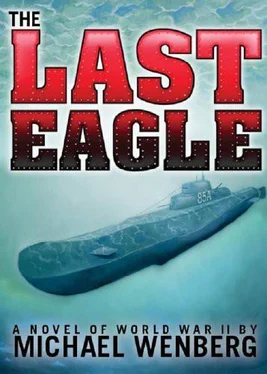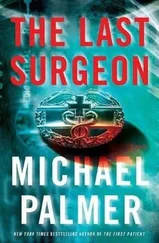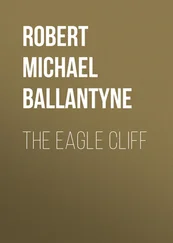Stefan ordered another course correction. The smoke and haze made it a guess. The channel ahead was almost completely blocked by the two ships in a death embrace. One option, which Stefan dismissed out of hand, was to slow the Eagle , and then feel her way by the wreckage. That would leave her an easy target for the Stukas. The other option was crazy. But Stefan had noticed that the fishing boat hit by the bomb had sagged in the middle as she veered in front of them. If he was right, her back was broken. And if the Eagle struck her near the break, he could slice through the wreckage like a hot knife through butter. If not, their fight would end right here.
“What about those men?” Ritter said it almost as a taunt. High above, the wings of one of the remaining Stukas dipped. She carried no more bombs, but her machine guns could be almost as deadly. “I need you on the gun,” Stefan barked.
Ritter hesitated and then climbed back into the gunner’s seat.
Stefan turned around just in time to see a man, trailing flames, jump from the deck of the larger vessel into the water. When he surfaced, he waved weakly at the approaching submarine. Stefan wondered if anyone else noticed him. It wouldn’t prevent him from doing what he had to do next, but it would save the second guessing.
Stefan leaned into the speakerphone, chanted another slight change in the Eagle’s course.
“You’re not going to stop, are you?” Pablo exclaimed as he crowded in next to him. “If you give way, I’ll throw him a line.” Two parallel lines of spray began to chase the Eagle up the channel. When the lines crossed the aft end of the Eagle , the bullets rang like the clang of jackhammers off the hull, and then continued on ahead, chewing over the burning vessels and stopping as the Stuka wheeled away for another pass.
“If we stop,” Stefan said, “we die.”
“If we don’t?”
Stefan shrugged. “Everyone dies.” He gestured over his shoulder. “Rescue boats are on their way. They will have to do their jobs. We still need to do ours.”
What would he do if he was in his place? Eryk didn’t know. And that was when he realized that command of a ship at war would never be for him. Stefan seemed to be enjoying himself. Eryk, on the other hand, was afraid he might wet himself. He crossed himself, muttered a silent prayer, turned away from the growing horror as the Eagle arrowed toward the burning vessels ahead and the man in the water. “I’m needed below,” he mumbled. Without waiting for permission or a reply, he disappeared through the hatch.
Ritter’s gun began a drum roll as he fired on another Stuka . Damn that Göring, Ritter thought. He wondered what the penalties would be if he strangled the head of the Luftwaffe himself. He had to survive this mission first, of course. He continued firing even though the tip of the Bofors began to glow red. When he felt a shudder convulse along the Eagle’s spine, the wail of tearing steel, he released his hand from the trigger and ducked.
At the moment she stabbed into the side of the burning fishing boat, the Eagle was racing along at top speed, better than 20 knots
Smoke obscured anyone watching from shore what was about to happen. The keeper of a nearby lighthouse, however, had a perfect view. He watched the Eagle split open the remains of the fishing boat like a ripe cantaloupe. There was another explosion as fuel tanks ruptured and the Eagle disappeared from view, completely engulfed by smoke and flames.
The keeper held his breath. Whoever was in charge of the submarine was insane, magnificently insane. But did he have any other choice? The keeper shook his head in answer to his own, unspoken question. A veteran of two wars, and countless skirmishes at sea, he was a man who knew the value of decision making. Often, hesitation came not from failure to ask the right question, but a fear of the answer. To stop dead in the water while under attack by the German aircraft would have been stupid and suicidal. Attempting to reverse course in the narrow channel would have been equally foolhardy. The only protection for the submarine was the deep waters of the Baltic. The captain had had only seconds in which to embrace the answer he must live with from now on. Surely, men would die either way he decided. His own men on the submarine, or the crews of the two fishing boats. Either way, the fate of many were resting on what he would decide. It was not a choice most men would have had the courage or the audacity to make. But the submarine, the old man saw with satisfaction, did not pause, did not waver, as she disappeared from view into the burning vessel.
The old man caught his breath, afraid the submarine had been hung up in the wreckage, but then the bow of the Eagle darted out of the billowing smoke and flames. Even from the distance, the keeper could see the fresh scarring on her flanks, slashed by the talons of torn metal. The identifying number on the side of the conning tower—87-A in big, white characters—was seared black in places. The Polish flag on the stern trailed flames. But the Eagle didn’t pause. She cleared the wreckage, darted past the harbor entrance, and churned out into the Baltic. A fogbank was lying in wait offshore. A few weeks earlier, the weather would not have been so kind. But it was fall. Already the hint of winter in the air. The keeper watched the Eagle , grunting with satisfaction as she disappeared from view. He pulled his coat tightly around his thin frame. A smile brightened his face when he saw the German planes give up, wheeling back to the east and then climbing. He heard a whistle from his stove below. “Tea time,” he muttered. He began the long, winding descent down the tower, holding the railing carefully with his right hand and humming the Polish national anthem quietly to himself.
Stefan hated fog. Particularly the gray stew that plagued the jagged Baltic coastline from fall to spring. It was a special menace that for centuries had made even the most stoic skippers old men well before their time.
Today, Stefan decided it was his favorite kind of weather. As the bow disappeared into the cloud, he tilted back his head, watching as tattered gray tendrils began to rush by overhead, diffusing the light, changing the quality of the sound of the sea, and muffling the bass-drum hammer of the racing diesels. Just before the fog completely obliterated the sky, Stefan grunted with satisfaction as he noticed the last Stuka turn away and begin heading back to its airfield in Germany.
They were safe, for the moment.
The Eagle plunged deeper into the refuge of the fogbank. Stefan closed his eyes, relishing the sudden change in temperature on his exposed cheekbones, the condensation growing like moss on his shaggy beard. After the madness of the preceding minutes, Stefan felt like they were entering a cathedral, everything gray, insulated from outside cares and desires. Perfect place for me, he thought, suddenly more tired than he could ever remember before, the last of the adrenaline, all that had kept him going the past hours, leaking from his bloodstream.
He knew he should be euphoric. If not for his direction, his decisions, the Eagle would still be bottled up in the harbor, or, more likely, sinking, many of her crew, his men, already dead. Instead, she was free and they would fight on.
He watched as the memory of the man on fire, leaping into the water, began to replay before his eyes. There was nothing he could have done for him, and yet, he knew that he had also died because of the decisions he had made. He also knew it was only the beginning. There would be more memories to add to the collection. This was only a start. “Better get used to it, buddy boy,” he muttered.
Читать дальше












